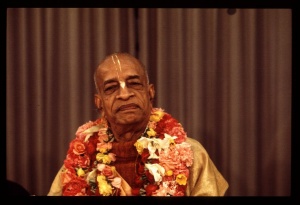SB 4.22.4: Difference between revisions
m (1 revision(s)) |
(Vanibot #0054 edit - transform synonyms into clickable links, which search similar occurrences) |
||
| (One intermediate revision by one other user not shown) | |||
| Line 1: | Line 1: | ||
{{info | {{info | ||
|speaker= | |speaker=Maitreya Ṛṣi | ||
|listener= | |listener=Vidura | ||
}} | }} | ||
[[Category:Srimad-Bhagavatam - Canto 04 Chapter 22|s04 ]] | |||
[[Category:Bhagavatam Verses Spoken by Maitreya Rsi - Vanisource|042204]] | |||
<div style="float:left">'''[[Srimad-Bhagavatam]] - [[SB 4|Fourth Canto]] - [[SB 4.22: Prthu Maharaja's Meeting with the Four Kumaras|Chapter 22: Pṛthu Mahārāja's Meeting with the Four Kumāras]]'''</div> | |||
<div style="float:right">[[File:Go-previous.png|link=SB 4.22.3]] '''[[SB 4.22.3]] - [[SB 4.22.5]]''' [[File:Go-next.png|link=SB 4.22.5]]</div> | |||
{{RandomImage}} | |||
==== TEXT 4 ==== | ==== TEXT 4 ==== | ||
<div | <div class="verse"> | ||
gauravād yantritaḥ sabhyaḥ | :gauravād yantritaḥ sabhyaḥ | ||
praśrayānata-kandharaḥ | :praśrayānata-kandharaḥ | ||
vidhivat pūjayāṁ cakre | :vidhivat pūjayāṁ cakre | ||
gṛhītādhyarhaṇāsanān | :gṛhītādhyarhaṇāsanān | ||
</div> | </div> | ||
| Line 16: | Line 22: | ||
==== SYNONYMS ==== | ==== SYNONYMS ==== | ||
<div | <div class="synonyms"> | ||
''[//vanipedia.org/wiki/Special:VaniSearch?s=gauravāt&tab=syno_o&ds=1 gauravāt]'' — glories; ''[//vanipedia.org/wiki/Special:VaniSearch?s=yantritaḥ&tab=syno_o&ds=1 yantritaḥ]'' — completely; ''[//vanipedia.org/wiki/Special:VaniSearch?s=sabhyaḥ&tab=syno_o&ds=1 sabhyaḥ]'' — most civilized; ''[//vanipedia.org/wiki/Special:VaniSearch?s=praśraya&tab=syno_o&ds=1 praśraya]'' — by humbleness; ''[//vanipedia.org/wiki/Special:VaniSearch?s=ānata&tab=syno_o&ds=1 ānata]-[//vanipedia.org/wiki/Special:VaniSearch?s=kandharaḥ&tab=syno_o&ds=1 kandharaḥ]'' — bowing down his shoulder; ''[//vanipedia.org/wiki/Special:VaniSearch?s=vidhi&tab=syno_o&ds=1 vidhi]-[//vanipedia.org/wiki/Special:VaniSearch?s=vat&tab=syno_o&ds=1 vat]'' — according to the instructions of the śāstra; ''[//vanipedia.org/wiki/Special:VaniSearch?s=pūjayām&tab=syno_o&ds=1 pūjayām]'' — by worshiping; ''[//vanipedia.org/wiki/Special:VaniSearch?s=cakre&tab=syno_o&ds=1 cakre]'' — performed; ''[//vanipedia.org/wiki/Special:VaniSearch?s=gṛhīta&tab=syno_o&ds=1 gṛhīta]'' — accepting; ''[//vanipedia.org/wiki/Special:VaniSearch?s=adhi&tab=syno_o&ds=1 adhi]'' — including; ''[//vanipedia.org/wiki/Special:VaniSearch?s=arhaṇa&tab=syno_o&ds=1 arhaṇa]'' — paraphernalia for reception; ''[//vanipedia.org/wiki/Special:VaniSearch?s=āsanān&tab=syno_o&ds=1 āsanān]'' — sitting places. | |||
</div> | </div> | ||
| Line 23: | Line 29: | ||
==== TRANSLATION ==== | ==== TRANSLATION ==== | ||
<div | <div class="translation"> | ||
When the great sages accepted their reception, according to the instructions of the śāstras, and finally took their seats offered by the King, the King, influenced by the glories of the sages, immediately bowed down. Thus he worshiped the four Kumāras. | When the great sages accepted their reception, according to the instructions of the śāstras, and finally took their seats offered by the King, the King, influenced by the glories of the sages, immediately bowed down. Thus he worshiped the four Kumāras. | ||
</div> | </div> | ||
| Line 30: | Line 36: | ||
==== PURPORT ==== | ==== PURPORT ==== | ||
<div | <div class="purport"> | ||
The four Kumāras are paramparā spiritual masters of the Vaiṣṇava sampradāya. Out of the four sampradāyas, namely Brahma-sampradāya, Śrī-sampradāya, Kumāra-sampradāya and Rudra-sampradāya, the disciplic succession of spiritual master to disciple known as the Kumāra-sampradāya is coming down from the four Kumāras. So Pṛthu Mahārāja was very respectful to the sampradāya-ācāryas. As it is said by Śrīla Viśvanātha Cakravartī Ṭhākura, sākṣād-dharitvena samasta-śāstraiḥ: a spiritual master, or the paramparā-ācārya, should be respected exactly like the Supreme Personality of Godhead. The word vidhivat is significant in this verse. This means that Pṛthu Mahārāja also strictly followed the injunctions of the śāstra in receiving a spiritual master, or ācārya, of the transcendental disciplic succession. Whenever an ācārya is seen, one should immediately bow down before him. Pṛthu Mahārāja did this properly; therefore the words used here are praśrayānata-kandharaḥ. Out of humility, he bowed down before the Kumāras. | The four Kumāras are ''paramparā'' spiritual masters of the Vaiṣṇava ''sampradāya.'' Out of the four ''sampradāyas'', namely Brahma-''sampradāya'', Śrī-''sampradāya'', Kumāra-''sampradāya'' and Rudra-''sampradāya'', the disciplic succession of spiritual master to disciple known as the Kumāra-''sampradāya'' is coming down from the four Kumāras. So Pṛthu Mahārāja was very respectful to the ''sampradāya-ācāryas''. As it is said by Śrīla Viśvanātha Cakravartī Ṭhākura, ''sākṣād-dharitvena samasta-śāstraiḥ'': a spiritual master, or the ''paramparā-ācārya'', should be respected exactly like the Supreme Personality of Godhead. The word ''vidhivat'' is significant in this verse. This means that Pṛthu Mahārāja also strictly followed the injunctions of the ''śāstra'' in receiving a spiritual master, or ''ācārya'', of the transcendental disciplic succession. Whenever an ''ācārya'' is seen, one should immediately bow down before him. Pṛthu Mahārāja did this properly; therefore the words used here are ''praśrayānata-kandharaḥ''. Out of humility, he bowed down before the Kumāras. | ||
</div> | </div> | ||
__NOTOC__ | |||
<div style="float:right; clear:both;">[[File:Go-previous.png|link=SB 4.22.3]] '''[[SB 4.22.3]] - [[SB 4.22.5]]''' [[File:Go-next.png|link=SB 4.22.5]]</div> | |||
__NOTOC__ | |||
__NOEDITSECTION__ | |||
Latest revision as of 21:35, 18 February 2024

A.C. Bhaktivedanta Swami Prabhupada
TEXT 4
- gauravād yantritaḥ sabhyaḥ
- praśrayānata-kandharaḥ
- vidhivat pūjayāṁ cakre
- gṛhītādhyarhaṇāsanān
SYNONYMS
gauravāt — glories; yantritaḥ — completely; sabhyaḥ — most civilized; praśraya — by humbleness; ānata-kandharaḥ — bowing down his shoulder; vidhi-vat — according to the instructions of the śāstra; pūjayām — by worshiping; cakre — performed; gṛhīta — accepting; adhi — including; arhaṇa — paraphernalia for reception; āsanān — sitting places.
TRANSLATION
When the great sages accepted their reception, according to the instructions of the śāstras, and finally took their seats offered by the King, the King, influenced by the glories of the sages, immediately bowed down. Thus he worshiped the four Kumāras.
PURPORT
The four Kumāras are paramparā spiritual masters of the Vaiṣṇava sampradāya. Out of the four sampradāyas, namely Brahma-sampradāya, Śrī-sampradāya, Kumāra-sampradāya and Rudra-sampradāya, the disciplic succession of spiritual master to disciple known as the Kumāra-sampradāya is coming down from the four Kumāras. So Pṛthu Mahārāja was very respectful to the sampradāya-ācāryas. As it is said by Śrīla Viśvanātha Cakravartī Ṭhākura, sākṣād-dharitvena samasta-śāstraiḥ: a spiritual master, or the paramparā-ācārya, should be respected exactly like the Supreme Personality of Godhead. The word vidhivat is significant in this verse. This means that Pṛthu Mahārāja also strictly followed the injunctions of the śāstra in receiving a spiritual master, or ācārya, of the transcendental disciplic succession. Whenever an ācārya is seen, one should immediately bow down before him. Pṛthu Mahārāja did this properly; therefore the words used here are praśrayānata-kandharaḥ. Out of humility, he bowed down before the Kumāras.